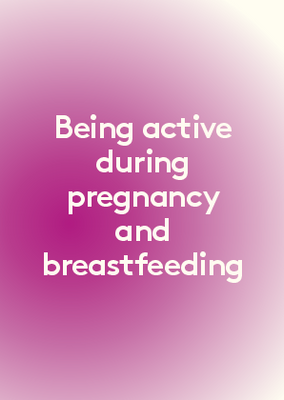Being active during pregnancy and breastfeeding

If you have a healthy, normal pregnancy, keeping active while you are pregnant is good for your health and the health of your baby. This booklet includes safe physical activity ideas, information on what physical activities to avoid, and when to take extra care during pregnancy and breastfeeding.
The full resource:
Healthy weight gain in pregnancy
It is normal to gain some weight during pregnancy. However, gaining too much extra weight during pregnancy can affect your health and the health of your baby.
Talk to your lead maternity carer about healthy weight gain for your pregnancy.
Physical Activity
If you’re already active, continue to maintain at least 30 minutes of physical activity on most days of the week.
Staying active can help prepare your body for labour, give you more energy, improve your mood and relieve aches and pains.
A good way to make sure you aren't pushing yourself too hard is to do the ‘Talk test’. Make sure you can hold a conversation while you exercise.
If you weren’t active before getting pregnant, it’s not too late to start, but it’s best to talk to your lead maternity carer first.
Start gently and build up to at least 30 minutes on most days of the week. Remember – some activity is better than none!

Extra care
Some things to remember and take extra care with:
Exercise within your limits
- don’t exercise to the point of exhaustion
As your pregnancy progresses your growing baby changes your centre of gravity
- this can affect balance during activities such as cycling or yoga

Pregnancy hormones can give your ligaments extra flexibility
- take care not to overstretch
Use a good support bra (not an underwire bra), along with loose clothing and supportive footwear.

Being pregnant increases your body temperature
- take extra care not to overheat in hot or humid weather
Drink plenty of water
- before, during and after physical activity

The extra weight puts added strain on your joints and muscles making it easier to injure yourself.
Remember to listen to your body. If an activity is causing you discomfort, headache or pain, or you are feeling dizzy, faint or out of breath, stop immediately and talk to your lead maternity carer.
Some conditions, such as high blood pressure while pregnant, may prevent you being too active during pregnancy. Your LMC will be able to advise you.
Activity
What types of physical activity are okay?

Swimming or aquarobics
- water temperature under 32º C (not hydrotherapy pool)

Household chores
- such as vacuuming or gardening

Strength-based exercises
- such as using light weights

Walking/jogging
- remember the ‘Talk test’

Yoga/Pilates
- modified for pregnant women

Pregnancy exercise classes

Pelvic floor muscle exercises
Caution
While pregnant it’s best to avoid:

Exercising in very hot humid conditions
- such as hot yoga

Scuba diving

Contact sports or those with the risk of getting hit in the stomach
- such as football, netball or martial arts

Physical activity with a risk of falling
- such as horse-riding or skiing

Any physical activity lying on your back
- especially after the first trimester, as the weight of your growing baby puts pressure on major blood vessels and could cause dizziness

In the later stages of pregnancy activities that involve jumping, frequent changes of direction and excessive stretching
- such as gymnastics or trampolining
Returning to physical activity after pregnancy
It's best to talk to your LMC before you return to physical activity after the birth of your child. If you have maintained your fitness throughout your pregnancy, you should be able to return to light activity fairly quickly after birth. If you have a caesarean section, you will need to wait for clearance from your LMC or doctor.
For more information visit:
- health.govt.nz/publication/food-and-nutrition-guidelines-healthy-pregnant-and-breastfeeding-women-background-paper
- health.govt.nz/your-health/healthy-living/pregnancy
- health.govt.nz/your-health/healthy-living/
- food-activity-and-sleep/healthy-weight/healthy-weight-gain-during-pregnancy
- health.govt.nz/your-health/healthy-living/babies-and-toddlers/breastfeeding-0
- health.govt.nz/your-health/services-and-support/health-care-services/maternity-services
- lalecheleague.org.nz
- midwife.org.nz
- physiotherapy.org.nz
- continence.org.nz/pages/Pelvic-Floor-First/131/